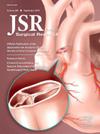Comparison of Adjunctive Anesthesia Within an ERAS Protocol: A Retrospective Cohort Study
IF 1.7
3区 医学
Q2 SURGERY
引用次数: 0
Abstract
Introduction
There is increasing focus on adjunctive anesthesia to reduce complications and improve pain control among surgical patients. This study aims to investigate and compare if the type of anesthesia (spinal, transversus abdominis plane [TAP] block, or general anesthesia alone) used in patients undergoing colorectal surgery within an Enhanced Recovery After Surgery protocol is associated with improved patient outcomes.
Materials and methods
This retrospective cohort study analyzed adult patients undergoing colorectal surgery at a Regional Hospital from December 2019 to October 2021. Data on demographics, operative details, complications, postoperative outcomes, and compliance were collected. The primary outcome was the association of adjunctive anesthesia on postoperative outcomes. After association analysis, variables yielding P < 0.10 associated with the primary or secondary outcomes were chosen for regression analysis, with calculation of univariable odds ratios (ORs) and a significance set at P < 0.05.
Results
Among 225 patients, 70 received a TAP block, 100 spinal anesthesia, and 55 general anesthesia. There were no differences in length of stay (P = 0.746), readmission (P = 0.144), bowel function (0.778), complications (P = 0.24), or pain control (P = 0.686). Spinal anesthesia was associated with higher oral intake in postanesthesia recovery unit (OR 5.3750, P < 0.001), lower narcotic use (OR 0.4303, P = 0.0213), and fewer discharges to skilled nursing facilities (OR 0.0303, P = 0.018).
Conclusions
Spinal anesthesia is associated with improved oral intake, reduced narcotic use, and less skilled nursing facility discharge in colorectal surgery patients compared to TAP blocks and general anesthesia.
ERAS方案中辅助麻醉的比较:一项回顾性队列研究
在外科手术患者中,越来越多的人关注辅助麻醉以减少并发症和改善疼痛控制。本研究旨在调查和比较在增强术后恢复方案中,结肠直肠手术患者使用的麻醉类型(脊柱、腹横面阻滞或单独全身麻醉)是否与改善患者预后相关。材料和方法本回顾性队列研究分析了2019年12月至2021年10月在某地区医院接受结直肠手术的成年患者。收集了人口统计学、手术细节、并发症、术后结果和依从性的数据。主要结局是辅助麻醉与术后结局的关系。经关联分析,产生P <的变量;选择与主要或次要结局相关的0.10进行回归分析,计算单变量优势比(or),显著性设置为P <;0.05.结果225例患者中,TAP阻滞70例,脊髓麻醉100例,全身麻醉55例。两组在住院时间(P = 0.746)、再入院(P = 0.144)、肠功能(0.778)、并发症(P = 0.24)和疼痛控制(P = 0.686)方面均无差异。脊髓麻醉与麻醉后恢复单元较高的口服摄入量相关(OR 5.3750, P <;0.001),较低的麻醉剂使用(OR 0.4303, P = 0.0213),较少的出院到熟练护理机构(OR 0.0303, P = 0.018)。结论与TAP阻滞和全身麻醉相比,脊髓麻醉可改善结直肠手术患者的口服摄入量,减少麻醉使用,减少熟练护理机构出院。
本文章由计算机程序翻译,如有差异,请以英文原文为准。
求助全文
约1分钟内获得全文
求助全文
来源期刊
CiteScore
3.90
自引率
4.50%
发文量
627
审稿时长
138 days
期刊介绍:
The Journal of Surgical Research: Clinical and Laboratory Investigation publishes original articles concerned with clinical and laboratory investigations relevant to surgical practice and teaching. The journal emphasizes reports of clinical investigations or fundamental research bearing directly on surgical management that will be of general interest to a broad range of surgeons and surgical researchers. The articles presented need not have been the products of surgeons or of surgical laboratories.
The Journal of Surgical Research also features review articles and special articles relating to educational, research, or social issues of interest to the academic surgical community.

 求助内容:
求助内容: 应助结果提醒方式:
应助结果提醒方式:


